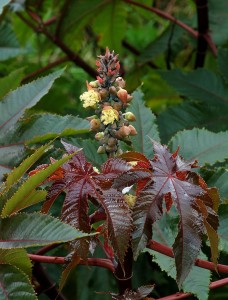Ricinus communis, the castor oil plant, is a species of flowering plant in the spurge family, Euphorbiaceae. It is the sole species in the monotypic genus, Ricinus, and subtribe, Ricininae.
Contents
Uses
Castor oil has many uses in medicine and other applications.
An alcoholic extract of the leaf was shown, in lab rats, to protect the liver from damage from certain poisons.Methanolic extracts of the leaves of Ricinus communis were used in antimicrobial testing against eight pathogenic bacteria in rats and showed antimicrobial properties. The extract was not toxic. The pericarp of Ricinus showed central nervous system effects in mice at low doses. At high doses mice quickly died. A water extract of the root bark showed analgesic activity in rats. Antihistamine and anti-inflammatory properties were found in ethanolic extract of Ricinus communis root bark.
Benefits
Castor Oil has been used both internally and externally for thousands of years due to its many wonderful health benefits. Since it can strengthen the immune system, castor oil is considered a great remedy to treat the following major illnesses and ailments:
- Multiple Sclerosis
- Parkinson’s Disease
- Cerebral Palsy
- Hair loss
- Pain from Arthritis and Rheumatism
It has also been found to help with many everyday problems such as:
- Yeast Infections
- Constipation
- Gastrointestinal Problems
- Menstrual Disorders
- Migraines
- Acne
- Sunburn
- Athlete’s Foot
- Ringworm
- Skin Abrasions
- Inflammation
Cautions
Strychnine, when inhaled, swallowed or absorbed through eyes or mouth, causes a poisoning which results in muscular convulsions and eventually death through asphyxia. While it has no known medicinal effects, in the past the convulsant effect was believed to be beneficial in small doses.
Interactions
We currently have no information for Interactions
Other names
Castor oil
References
Source: Wikipedia, https://en.wikipedia.org/wiki/Ricinus#Medicinal_uses
HomeRemediesWeb, http://www.homeremediesweb.com/castor-oil-health-benefits.php

